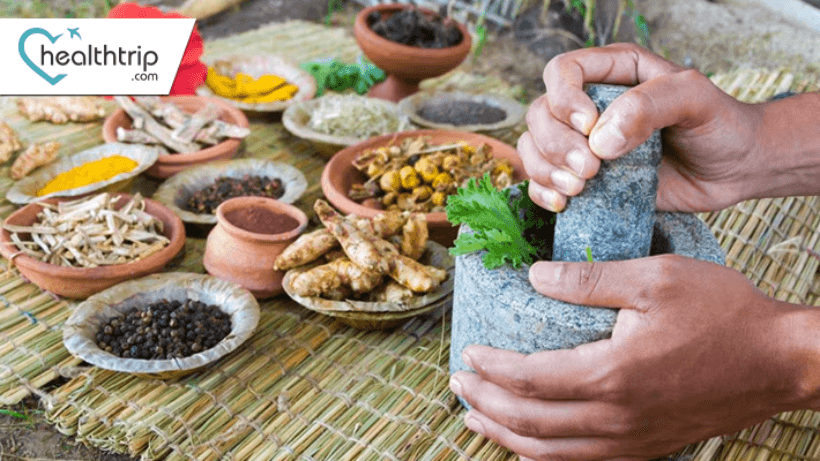
Is Ayurveda the Answer to Blood Cancer? Let's explore what ayurveda says
28 Nov, 2023
 Healthtrip Team
Healthtrip TeamBlood cancer, medically known as hematologic cancer, encompasses a group of malignancies affecting the blood, bone marrow, and lymphatic system. This category includes leukemia, lymphoma, and myeloma. Conventional medical treatments for blood cancer typically include chemotherapy, radiation therapy, and stem cell transplantation. However, there is a growing interest in alternative or complementary therapies, such as Ayurveda, among individuals seeking to manage the symptoms and side effects of these treatments or explore alternative approaches to healing. In this blog post, we will delve into Ayurveda's perspective on blood cancer and its potential role in managing this condition.
Most popular procedures in India
Exploring Ayurveda
Ayurveda is an ancient system of medicine with roots dating back thousands of years in India. It revolves around the fundamental concept of balance and harmony within the body, mind, and spirit. According to Ayurvedic philosophy, imbalances in the body's doshas—Vata, Pitta, and Kapha—can lead to a range of health issues, including cancer. Ayurveda's primary objective is to restore this balance through a combination of dietary adjustments, lifestyle modifications, herbal remedies, and various therapeutic practices.
Wellness Treatments
Give yourself the time to relax
Lowest Prices Guaranteed!

Lowest Prices Guaranteed!
Ayurvedic Approach to Blood Cancer
1. Identifying the Root Cause:
Ayurveda's personalized approach to healthcare is a key aspect of its effectiveness in addressing various health conditions, including blood cancer. The assessment of an individual's Prakriti (constitution) and Vikriti (current state of imbalance) is fundamental in Ayurvedic diagnosis and treatment planning. Here's how this personalized approach applies to managing blood cancer:
a. Prakriti Assessment:
- Ayurveda recognizes that each person has a unique constitution, which is determined by the predominance of three doshas: Vata, Pitta, and Kapha. These doshas govern various physiological and psychological aspects of an individual's makeup.
- For example, an individual with a predominantly Pitta constitution may have a natural tendency toward qualities associated with Pitta dosha, such as heat, intensity, and precision. Their physical and mental characteristics will reflect these qualities.
b. Vikriti Assessment:
- In addition to understanding the individual's Prakriti, Ayurvedic practitioners assess the Vikriti, which refers to the current imbalances or disturbances in the doshas that may be contributing to the disease.
- In the case of blood cancer, an individual may have an aggravated Pitta dosha, leading to an imbalance characterized by heat, inflammation, and excess acidity. This doshic imbalance may contribute to the development or progression of the disease.
c. Tailored Treatment and Recommendations:
- Once the Prakriti and Vikriti are determined, Ayurvedic practitioners can create a personalized treatment plan that addresses the root causes of the disease. This may involve specific dietary modifications, herbal formulations, lifestyle changes, and therapies that aim to balance or pacify the aggravated dosha(s).
- For the individual with a Pitta imbalance, Ayurvedic treatments and recommendations may include cooling herbs, anti-inflammatory diet plans, stress-reduction techniques, and therapies that help reduce heat and acidity in the body.
d. Monitoring and Adjustments:
- Ayurvedic treatment is an ongoing process, and practitioners continually monitor the patient's progress and make necessary adjustments to the treatment plan based on their response to the therapies.
- The goal is not only to manage the symptoms of blood cancer but also to address the underlying imbalances, promote overall health, and prevent the recurrence of the disease.
It's important to note that Ayurveda is typically used as a complementary therapy alongside conventional cancer treatments. Collaboration between the patient's oncologist and Ayurvedic practitioner is crucial to ensure a well-coordinated and safe approach to managing blood cancer. Ayurvedic principles can provide valuable support by addressing the individual's constitution and specific imbalances, thereby contributing to a holistic and integrative approach to cancer care.
2. Dietary Modifications:
dietary modifications in Ayurveda play a crucial role in supporting the body's healing process, especially for individuals with blood cancer. Ayurvedic dietary recommendations are based on the principles of balancing the doshas (Vata, Pitta, Kapha) and addressing any imbalances that may contribute to the disease. Here's a detailed look at the dietary modifications for blood cancer in Ayurveda:
a. Avoiding Aggravating Foods:
Ayurveda recognizes that imbalances in specific doshas can contribute to health issues. In the context of blood cancer, certain doshas may be aggravated. To address this, it's essential to avoid foods that can worsen the imbalances. These typically include:
- Spicy Foods: Spicy foods can increase heat and inflammation in the body, which may exacerbate conditions associated with Pitta dosha imbalances.
- Oily and Fried Foods: Excessive oily and fried foods can contribute to excess Pitta and Kapha dosha imbalances.
- Processed and Preservative-Laden Foods: Processed foods often contain additives, preservatives, and artificial ingredients that can disrupt the body's natural balance.
b. Emphasizing Cooling and Balancing Foods:
Ayurvedic dietary recommendations for blood cancer focus on foods that are considered cooling and balancing to counteract excess heat and inflammation. These foods often include:
- Fresh Fruits: Pomegranates, grapes, and melons are known for their cooling properties and are rich in antioxidants, vitamins, and minerals that support overall health and immunity.
- Vegetables: Leafy greens like spinach and kale are cooling and nutrient-dense. They provide essential vitamins and minerals without aggravating imbalances.
- Whole Grains: Whole grains such as brown rice, quinoa, and oats are nourishing and provide sustained energy without causing excessive heat in the body.
- Herbs and Spices: Various herbs and spices, such as turmeric, coriander, and fennel, can be incorporated into the diet for their cooling and digestive benefits. Turmeric, in particular, is well-known for its anti-inflammatory properties and may help manage inflammation associated with cancer.
c. . Herbal Supplements and Preparations:
- Ayurvedic practitioners may recommend specific herbal supplements or preparations tailored to the individual's constitution and imbalances. These may include herbal formulations designed to address the root causes of the disease, enhance immunity, and reduce inflammation.
- For example, turmeric may be recommended for its anti-inflammatory properties, and it can be consumed as a spice in cooking or taken as a supplement.
d. Mindful Eating Practices:
Ayurveda emphasizes mindful eating practices to enhance digestion and assimilation of nutrients. This includes eating in a calm and peaceful environment, chewing food thoroughly, and being attentive to hunger and satiety cues.
e. Individualized Approach:
Ayurveda recognizes that each person is unique, and dietary recommendations are highly individualized. The specific foods and herbs recommended may vary based on the individual's constitution (Prakriti) and the current imbalances (Vikriti) contributing to the disease.
It's crucial for individuals with blood cancer to work closely with a qualified Ayurvedic practitioner who can assess their constitution, imbalances, and overall health to create a personalized dietary plan. Additionally, Ayurveda is typically used as a complemaentary therapy alongside conventional cancer treatments, and patients should consult with their oncologist to ensure that dietary modifications align with their treatment plan and do not interfere with medications or other medical recommendations. Ayurvedic dietary principles can provide valuable support for individuals on their healing journey.
3. Herbal Remedies:
Ayurvedic herbs and formulations have been used for centuries to support cancer patients in their holistic healing journey. In Ayurveda, the approach to treating cancer is multifaceted, focusing not only on addressing the disease itself but also on balancing the individual's overall health and well-being. Here are some commonly used herbs and their potential benefits for cancer patients:
a. Ashwagandha (Withania somnifera):
- Adaptogenic Properties: Ashwagandha is renowned for its adaptogenic qualities, which means it helps the body adapt to stress and maintain balance. Cancer patients often experience physical and emotional stress, and Ashwagandha may help alleviate some of these symptoms.
- Vitality: It is believed to improve overall vitality, helping patients feel more energized and resilient during their cancer journey.
b. Turmeric (Curcumin):
- Anti-Inflammatory Properties: Curcumin, the active compound in turmeric, is well-known for its potent anti-inflammatory properties. Chronic inflammation is often associated with cancer, and curcumin may help manage inflammation in the body.
- Antioxidant Benefits: Curcumin is a powerful antioxidant that can neutralize harmful free radicals, potentially reducing oxidative stress, which plays a role in cancer development.
c. Tulsi (Holy Basil):
- Adaptogenic and Immune-Modulating Properties: Tulsi, or Holy Basil, is considered an adaptogen, helping the body adapt to stress. It is also known as an immune-modulator, which means it may assist the immune system in its response to cancer.
- Stress Reduction: Cancer patients often face significant stress, and Tulsi may help alleviate stress-related symptoms, such as anxiety and insomnia.
d. Neem (Azadirachta indica):
- Detoxifying Properties: Neem is highly regarded for its detoxifying properties, which may assist in removing toxins from the body. Detoxification can support the body's natural healing processes.
- Skin Care: In some cases of blood cancers, skin-related symptoms may occur. Neem's antimicrobial and skin-soothing properties can be beneficial in managing such symptoms.
Ayurvedic practitioners take a personalized approach to treatment, considering the patient's constitution (dosha), the type and stage of blood cancer, and other individual factors. This individualized approach may lead to recommendations of specific herbs or herbal formulations tailored to the patient's unique needs.
4. Panchakarma Therapy:
Panchakarma therapy is a comprehensive and traditional Ayurvedic detoxification and purification process that is often recommended to support individuals dealing with various health conditions, including cancer. While it may not directly treat cancer, Panchakarma plays a pivotal role in promoting overall well-being and enhancing the body's natural healing mechanisms. Here's a closer look at Panchakarma and its potential benefits for cancer patients:
a. Elimination of Toxins (Ama):
- Panchakarma aims to eliminate accumulated toxins (ama) from the body. In the context of cancer, these toxins may result from cancer treatments like chemotherapy or radiation therapy, as well as from the disease itself.
- By removing ama, Panchakarma helps reduce the toxic burden on the body, potentially alleviating some of the side effects associated with cancer treatments, such as nausea, fatigue, and digestive issues.
b. Balancing the Doshas:
- Panchakarma procedures are designed to restore balance to the doshas (Vata, Pitta, Kapha), which may be disturbed during cancer or cancer treatment.
- For example, Basti (enema therapy) can help balance Vata dosha, while Virechana (therapeutic purgation) can reduce excess Pitta dosha.
- Balancing the doshas can contribute to a sense of equilibrium and improved overall health.
c. Specific Panchakarma Procedures for Cancer Patients:
- The specific Panchakarma procedures recommended for cancer patients may vary based on their constitution (Prakriti) and the imbalances (Vikriti) associated with their condition.
- Abhyanga (oil massage) and Swedana (herbal steam bath) are commonly used to prepare the body for detoxification, promote relaxation, and improve circulation.
- Virechana may be recommended to help eliminate excess Pitta, particularly in cases where inflammation is a prominent symptom.
- Basti (enema therapy) can support detoxification, improve digestion, and balance Vata dosha.
- Nasya (nasal administration) can enhance mental clarity and alleviate symptoms like headaches and congestion that may be associated with cancer or its treatment.
d. Enhanced Immune Function and Relaxation:
- Panchakarma therapies promote relaxation and stress reduction, which are crucial for cancer patients dealing with emotional and physical stressors.
- Improved circulation and lymphatic flow, as a result of Panchakarma, can support the immune system, enhancing the body's ability to defend against illnesses and infections.
It's important to note that Panchakarma should be administered by trained and experienced Ayurvedic practitioners who can tailor the treatment to the individual's unique needs and condition. Additionally, Panchakarma is typically used as a complementary therapy alongside conventional cancer treatments, and patients should inform their oncologist about their intention to undergo Panchakarma to ensure its compatibility with their overall treatment plan.
In summary, Panchakarma therapy offers a holistic approach to wellness and can be a valuable supportive therapy for cancer patients, aiding in detoxification, dosha balancing, immune enhancement, and overall relaxation and well-being.
5. Mind-Body Practices:
Mind-body practices are an integral component of Ayurvedic cancer care, highlighting the profound connection between mental and emotional well-being and overall health. These practices can significantly contribute to a patient's quality of life during their cancer journey. Here's a closer look at some of the key mind-body practices recommended in Ayurveda for cancer patients:
a. Yoga:
- Yoga is a holistic practice that combines physical postures (asanas), breath control (pranayama), and meditation to promote physical, mental, and emotional well-being.
- Physical Benefits: Yoga can help improve flexibility, strength, and balance. It can also alleviate physical symptoms and side effects of cancer and its treatments, such as fatigue and muscle tension.
- Emotional Benefits: The meditative and mindfulness aspects of yoga can help reduce stress, anxiety, and depression. It promotes relaxation and a sense of inner calm.
- Spiritual Connection: For many, yoga provides a deeper sense of spiritual connection and purpose, helping individuals find meaning and resilience during challenging times.
b. Meditation:
- Meditation practices, including mindfulness meditation, offer cancer patients valuable tools for managing emotional and psychological challenges:
- Stress Reduction: Regular meditation practice can significantly reduce stress levels, which is crucial for cancer patients dealing with the anxiety and uncertainty that often accompany the diagnosis and treatment.
- Pain Management: Meditation can help individuals manage cancer-related pain by promoting relaxation and reducing the perception of pain.
- Enhanced Emotional Resilience: Meditation fosters emotional resilience, allowing patients to better cope with the emotional roller coaster of a cancer diagnosis and treatment.
c. Pranayama (Breath Control):
- Pranayama exercises focus on conscious and controlled breathing techniques. These practices can have several benefits for cancer patients:
- Stress Management: Deep, controlled breathing can activate the body's relaxation response, reducing stress and anxiety.
- Improved Lung Function: Pranayama exercises can enhance lung capacity and function, which can be particularly helpful for cancer patients who may experience respiratory challenges.
- Mental Clarity: Conscious breathing practices improve mental clarity and focus, aiding patients in making informed decisions about their treatment and care.
These mind-body practices are adaptable and can be customized to suit the individual's physical capabilities and comfort levels. They empower cancer patients to actively participate in their healing journey and enhance their overall quality of life. Ayurvedic practitioners often work with patients to integrate these practices into their daily routine, ensuring that they receive the maximum benefits in terms of mental and emotional well-being. Additionally, these practices can complement conventional cancer treatments by providing holistic support for the mind and body during the healing process.
6. Lifestyle Modifications:
Ayurveda places a strong emphasis on maintaining a balanced and healthy lifestyle, as it is considered integral to overall well-being, especially for individuals dealing with serious illnesses like blood cancer. Here are some key lifestyle modifications recommended in Ayurveda for cancer patients:
a. Regular Sleep Schedule:
- Maintaining a consistent and adequate sleep schedule is crucial for supporting the body's natural healing processes. Adequate sleep helps the body repair and regenerate tissues, strengthen the immune system, and reduce stress.
- Ayurveda suggests going to bed and waking up at the same times each day to align with the body's natural circadian rhythms. Creating a peaceful and comfortable sleep environment can also improve the quality of sleep.
b. Stress Management:
- Effective stress management is essential for cancer patients, as chronic stress can weaken the immune system and exacerbate the disease. Ayurveda offers various relaxation techniques, mindfulness practices, and stress-reduction strategies, including meditation, yoga, and deep breathing exercises (pranayama).
- Practicing these techniques regularly can help individuals manage stress and improve their overall mental and emotional well-being.
c. Physical Activity:
- Staying physically active within one's capacity is encouraged in Ayurveda. Gentle exercises, such as walking, yoga, and tai chi, can promote circulation, enhance vitality, and reduce feelings of fatigue.
- It's important for cancer patients to consult with their healthcare team to determine appropriate levels of physical activity based on their individual condition and treatment plan.
d. Toxin-Free Lifestyle:
- Avoiding exposure to environmental toxins and adopting a clean and toxin-free lifestyle is essential for supporting the body's natural detoxification processes. This includes reducing exposure to pollutants, pesticides, and harmful chemicals.
- Ayurveda also recommends following a clean and balanced diet to minimize the intake of processed foods, additives, and preservatives.
e. Nutrition:
- A balanced and nourishing diet is a cornerstone of Ayurvedic cancer care. Consuming whole, fresh foods that are appropriate for one's dosha and constitution can provide the body with essential nutrients and support overall health.
- Ayurveda also encourages mindful eating practices, such as eating in a peaceful environment, chewing food thoroughly, and being attentive to hunger and satiety cues.
f. Social and Emotional Support:
- Building a strong support network of friends and family is vital for cancer patients. Emotional well-being plays a significant role in the healing process.
- Ayurvedic principles emphasize the importance of nurturing positive relationships and seeking emotional support when needed.
Ayurveda views the individual as a whole, addressing not only physical but also mental, emotional, and spiritual aspects of health. These lifestyle modifications are aimed at creating a harmonious and balanced life that supports the body's innate healing abilities. It's essential for individuals with blood cancer to work closely with their healthcare team, including Ayurvedic practitioners, to tailor these lifestyle recommendations to their specific needs and circumstances.
In conclusion, Ayurveda offers a holistic approach to managing blood cancer by addressing the root causes, supporting the body through dietary and herbal interventions, promoting detoxification and mental well-being, and encouraging a balanced lifestyle. It is essential to consult with both Ayurvedic practitioners and conventional medical professionals to create a comprehensive treatment plan that combines the strengths of both approaches for the best possible outcome in the management of blood cancer.
Most popular wellness packages
Related Blogs

Holistic Wellness for Liver Cancer in Indian Retreats
IntroductionHolistic healing retreats have gained popularity as complementary approaches to

Alternative and Integrative Therapies for Lung Cancer treatment in India
Alternative and integrative therapies, along with a healthy lifestyle, can

Fatty Liver Treatment Strategies in the UAE
IntroductionFatty liver disease, a condition characterized by the accumulation of

Considering Alternative Therapies for Vaginal Cancer? Weighing the Pros and Cons
Vaginal cancer, a relatively uncommon but complex condition, predominantly affects

Alternative Prostate Cancer Treatments in the UAE
Introduction Prostate cancer is a prevalent health concern worldwide, affecting millions

Preventing Coronary Artery Disease: Lifestyle Changes and Tips
Coronary Artery Disease (CAD) is a leading cause of heart-related










